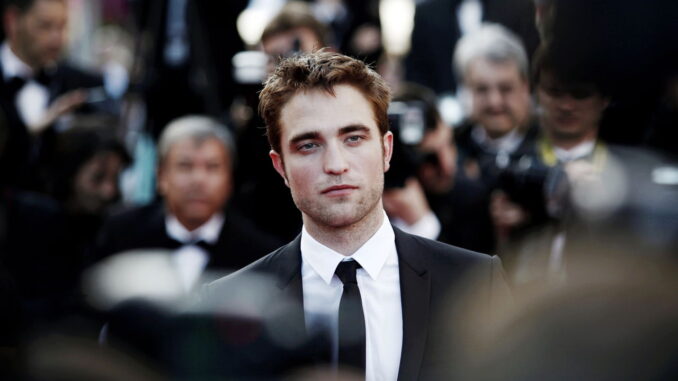
The air on the Running Man set usually hummed with a chaotic symphony of shouts, betrayals, and the frantic thud of sneakers on linoleum. Laughter, both genuine and forced, was the prevailing currency, traded freely by the seven beloved members whose faces were as familiar to South Korean households as their own. But on this particular Tuesday, a different kind of hush fell, thick and disbelieving, as a figure appeared who seemed to have materialized from an entirely different dimension of celebrity.
Robert Pattinson.
The name itself, usually whispered in reverent tones in the hallowed halls of Hollywood, felt utterly alien against the backdrop of an indoor obstacle course designed to be sticky, slippery, and spectacularly embarrassing. He strode onto the set not with the usual boisterous fanfare of a K-Pop idol or the familiar, self-deprecating bow of a local actor, but with the quiet intensity of a man accustomed to navigating Gotham’s shadows or the existential dread of arthouse cinema. His posture was still, his gaze a touch bewildered, like a raven accidentally alighting in a parrot convention.
The Running Man members, usually quick with a joke or a jab, were momentarily struck dumb. Even the unflappable Yoo Jae-suk, the ‘Nation’s MC,’ found his trademark grin faltering, replaced by a wide-eyed stare. Lee Kwang-soo, the ‘Giraffe,’ actually cringed, as if fearing that his usual antics might somehow offend this ethereal being. HaHa adjusted his hat, trying to look cool, and Kim Jong-kook, the ‘Commander,’ just crossed his powerful arms, a flicker of something akin to awe in his usually steely eyes.
The initial segment was, predictably, a masterclass in fish-out-of-water comedy. Pattinson, clad in a tracksuit that looked oddly pristine, attempted to decipher the rapid-fire Korean instructions punctuated by enthusiastic gestures. His polite, slightly-too-soft English answers were met with a flurry of translated explanations that often seemed to add more layers of confusion than clarity. When tasked with a game involving smashing watermelons with his head while blindfolded (a typical Running Man absurdity), the bewildered intensity in his eyes as he cautiously approached the fruit was a cinematic masterpiece in itself. His hands, which had once cradled the One Ring of Sauron’s influence (or at least a very convincing prop), now fumbled with a plastic mallet, the awkwardness palpable, yet endearing.
But then, something shifted. It began subtly, a flicker of something unexpected – a competitive glint in his eye during a particularly messy food challenge, a wry smirk playing on his lips as Kwang-soo attempted to betray him for a measly advantage. The brooding actor known for his brooding roles slowly, almost imperceptibly, began to loosen.
In the infamous name-tag ripping game, the pinnacle of Running Man’s physical comedy, Pattinson was initially a liability. He was too polite, too hesitant. He’d apologize after accidentally bumping into someone, a stark contrast to the ruthless, grab-and-tear ethos of the game. Yet, when cornered by Jong-kook, instead of collapsing meekly, a flash of unexpected defiance sparked. He dodged, he weaved, he even managed a surprisingly agile duck that sent the Commander stumbling. It wasn't the strength of a superhero, but the desperate, almost frantic energy of a character truly fighting for survival. And in that moment, he wasn't Robert Pattinson the Movie Star; he was just another contestant, sweaty and slightly disheveled, genuinely trying not to lose.
The true breakthrough came with a seemingly simple mission: a charades game. While his initial attempts were stiff, almost painfully self-conscious, the sheer absurdity of trying to mime a dolphin giving birth or a particularly energetic K-Pop dance hit a nerve. He started to laugh. Not a polite chuckle, but a genuine, unforced laugh that crinkled the corners of his eyes and showcased a set of teeth usually reserved for behind-the-scenes bloopers or private jokes with close friends. It was the sound of a man shedding his carefully constructed persona, if only for an afternoon, allowing the chaotic, joyful energy of Running Man to seep into his very pores.
By the end of the episode, as the sunset cast long shadows across the set, Pattinson, though undoubtedly exhausted and perhaps a little sticky, stood beaming amongst the cast. He had not only endured the madness; he had, in his own quiet, understated way, participated in it. He left with a signed name-tag from Jong-kook, a flurry of selfies with Kwang-soo (who had long since overcome his awe and reverted to his usual parasitic ways), and an experience that transcended the usual celebrity publicity circuit.
Robert Pattinson on Running Man was more than just a celebrity cameo; it was a cultural collision, a beautifully awkward fusion of two disparate worlds. It was a testament to the universal language of awkward humor, unexpected camaraderie, and the sheer joy of watching someone wildly out of their element, only to find a surprising, relatable humanity beneath the veneer of stardom. The memory, like a particularly baffling and brilliant dream, lingered – a testament to the day the serious, brooding actor embraced the joyous, chaotic heart of Korean variety.
